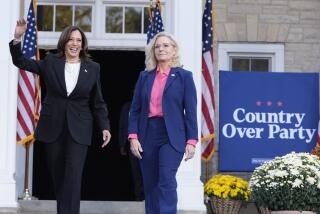Second Fiddles Attuned to Very Different Scores
- Share via
WILKES-BARRE, Pa. — As he campaigns around the country, Vice President Dick Cheney is fond of telling audiences that he is no John Edwards. Cheney says the Democratic vice presidential candidate was chosen because of his charm, good looks, sexiness and great hair.
“How do you think I got the job?” says the balding, stout 63-year-old to inevitable laughter.
Physical differences aren’t all that distinguish the vice presidential contenders. With the electorate highly polarized, neither candidate is filling a strictly traditional role.
The two candidates have this much in common: They play to their strengths. In both cases their strengths correspond to their campaign strategy.
For Cheney, who is highly regarded by the Republican right but anathema to moderates, that translates to audiences that are mostly die-hard Republican. Edwards, more moderate than presidential nominee Sen. John F. Kerry, is more likely than Cheney to seek out audience members of both parties.
Cheney sometimes plays the traditional role of the vice presidential candidate as attack dog against the opposition so that the presidential candidate can remain above the fray.
Edwards shuns the attack role, finding that it conflicts with his sunny, I’m-for-the-underdog image.
In his standard speech, Cheney emphasizes issues of national security. Edwards’ favorite theme is the economy.
Perhaps the most telling distinction between Cheney and Edwards is in their choice of audiences. The Republicans have calculated that they can do more for their vote totals by firing up Republican true believers and making sure they vote on election day than by appealing to Democrats and independents.
In a year in which polls have shown few undecided voters, Cheney’s strategy reflects the Bush campaign’s belief that the election will go to the party that gets more of its faithful to the polls, not the one that wins the most fence-straddlers.
Edwards is seeking out bipartisan audiences. For a rally scheduled today at Jefferson County Fairgrounds in Colorado, Edwards gave six tickets each to members of Women for Kerry and asked that they give five of them to undecided voters.
“Bush and Cheney need to pander to extreme elements in their own party,” said Mark Kornblau, an Edwards spokesman. “The Democrats are united behind us, and that lets us reach out to independents.”
Dante J. Scala, a political scientist at St. Anselm College in Manchester, N.H., says which approach will determine the winner is a close call -- as close as polls show the race to be.
Despite the polarization of the electorate, the Bush campaign expects turnout to be close to the 2000 election’s 51%. “They don’t think Kerry can mount the kind of campaign that will motivate voters who don’t ordinarily vote,” Scala said.
The Democrats hope for a 54% turnout, which would be the highest since 1972 except for the 1992 race, in which third-party candidate Ross Perot brought many nonvoters to the polls.
Of the two candidates, Cheney more often fills the traditional role of attacking the opposition. When his campaign bus reached Pottsville, Pa., on Tuesday, he tried to tarnish Kerry with the name of his fellow liberal Massachusetts senator, Edward M. Kennedy: “I listened to what Sen. Kennedy -- excuse me, I get them confused sometimes -- had to say in Boston....”
And in Hazleton, Pa., he urged voters to examine Kerry’s and Edwards’ records. “They do have a record,” he said, adding with a smile, “Maybe I ought to rephrase that.”
University of Kentucky political scientist Donald Gross said the vice presidential candidates’ attack role could be diminished this year because supposedly independent organizations had assumed it. Swift Boat Veterans for Truth, for example, is responsible for advertisements accusing Kerry of embellishing his Vietnam War record.
Most apparently, Cheney and Edwards differ significantly in their campaign styles and choice of issues.
Here in Wilkes-Barre, Cheney spoke at length about the war on terrorism. His expertise on international affairs impresses audiences and has become one of his selling points.
His declaration that the Bush administration will not wait for a “permission slip” from other nations to defend the U.S. militarily is a sure-fire applause line.
Only before supportive audiences does Cheney turn to the economy. In Pottsville, he said: “This is a strong economy, and it’s getting stronger. The Bush tax cuts are working.”
Edwards is at least as far out of his element when he talks about national security. Speaking of Al Qaeda in campagin speeches after the Democratic convention (“You cannot run. You cannot hide. We will destroy you”), his message fell flat.
Edwards has repeatedly referred to himself as the son of a mill worker. So, Cheney’s wife, Lynne, introduced her husband this week as someone who, as a young man, loaded 100-pound sacks of bentonite onto railroad cars, dug ditches and laid power lines.
Staff writer James Rainey in Los Angeles contributed to this report.
More to Read
Get the L.A. Times Politics newsletter
Deeply reported insights into legislation, politics and policy from Sacramento, Washington and beyond. In your inbox twice per week.
You may occasionally receive promotional content from the Los Angeles Times.











